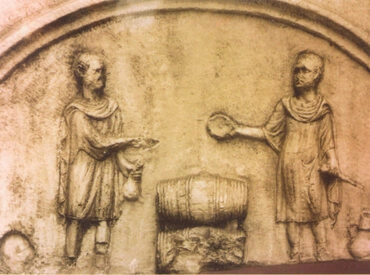1
Als gijlieden nu het land zult doen vallen in erfenis, zo zult gij een hefoffer den HEERE offeren, tot een heilige plaats, van het land; de lengte zal zijn de lengte van vijf en twintig duizend meetrieten, en de breedte tien duizend; dat zal in zijn gehele grenzen rondom heilig zijn.
2
Hiervan zullen tot het heiligdom zijn vijfhonderd met vijfhonderd, vierkant rondom; en het zal vijftig ellen hebben tot een buitenruim rondom.
3
Alzo zult gij meten van deze maat, de lengte van vijf en twintig duizend, en de breedte van tien duizend; en daarin zal het heiligdom zijn met het heilige der heiligen.
4
Dat zal een heilige plaats zijn van het land; zij zal zijn voor de priesteren, die het heiligdom bedienen, die naderen om den HEERE te dienen; en het zal hun een plaats zijn tot huizen, en een heilige plaats voor het heiligdom.
5
Voorts zullen de Levieten, die dienaars des huizes, ook de lengte hebben van vijf en twintig duizend, en de breedte van tien duizend, hunlieden tot een bezitting, voor twintig kameren.
6
En tot bezitting van de stad zult gij geven de breedte van vijf duizend en de lengte van vijf en twintig duizend, tegenover het heilig hefoffer; voor het ganse huis Israels zal het zijn.
7
De vorst nu zal zijn deel hebben van deze en van gene zijde des heiligen hefoffers en der bezitting der stad, voor aan het heilig hefoffer, en voor aan de bezitting der stad; van den westerhoek westwaarts, en van den oosterhoek oostwaarts; en de lengte zal zijn tegenover een der delen, van de westergrens tot de oostergrens toe.
8
Dit land aangaande, het zal hem tot een bezitting zijn in Israel; en Mijn vorsten zullen Mijn volk niet meer verdrukken, maar den huize Israels het land laten, naar hun stammen.
9
Alzo zegt de Heere Heere: Het is te veel voor u, gij vorsten Israels! doet geweld en verstoring weg, en doet recht en gerechtigheid; neemt uw uitstortingen op van Mijn volk, spreekt de Heere Heere.
10
Een rechte waag, en een rechte efa, en een rechte bath zult gijlieden hebben.
11
Een efa en Een bath zullen van enerlei mate zijn, dat Een bath het tiende deel van Een homer houde; ook Een efa het tiende deel van Een homer; de mate daarvan zal zijn naar den homer.
12
En de sikkel zal zijn van twintig gera; twintig sikkelen, vijf en twintig sikkelen, en vijftien sikkelen, zal ulieden een pond zijn.
13
Dit is het hefoffer, dat gijlieden offeren zult: het zesde deel van een efa van een homer tarwe; ook zult gij het zesde deel van een efa geven van een homer gerst.
14
Aangaande de inzetting van olie, van een bath olie; gij zult offeren het tiende deel van een bath uit een kor, hetwelk is een homer van tien bath, want tien bath zijn een homer.
15
Voorts een lam uit de kudde, uit de tweehonderd, uit het waterrijke land van Israel, tot spijsoffer, en tot brandoffer, en tot dankofferen om verzoening over hen te doen, spreekt de Heere Heere.
16
Al het volk des lands zal in dit hefoffer zijn, voor den vorst in Israel.
17
En het zal den vorst opleggen te offeren de brandofferen, en het spijsoffer, en het drankoffer, op de feesten, en op de nieuwe maanden, en op de sabbatten, op alle gezette hoogtijden van het huis Israels; hij zal het zondoffer, en het spijsoffer, en het brandoffer, en de dankofferen doen, om verzoening te doen voor het huis Israels.
18
Alzo zegt de Heere Heere: In de eerste maand, op den eersten der maand, zult gij een volkomen var, een jong rund, nemen; en gij zult het heiligdom ontzondigen.
19
En de priester zal van het bloed des zondoffers nemen, en doen het aan de posten des huizes, en aan de vier hoeken van het afzetsel des altaars, en aan de posten der poorten van het binnenste voorhof.
20
Alzo zult gij ook doen op den zevenden in die maand; vanwege den afdwalende, en vanwege den slechte; alzo zult gijlieden het huis verzoenen.
21
In de eerste maand, op den veertienden dag der maand, zal ulieden het pascha zijn; een feest van zeven dagen, ongezuurde broden zal men eten.
22
En de vorst zal op denzelven dag voor zichzelven, en voor al het volk des lands, bereiden een var des zondoffers.
23
En de zeven dagen van het feest zal hij een brandoffer den HEERE bereiden, van zeven varren en zeven rammen, die volkomen zijn, dagelijks, de zeven dagen lang, en een zondoffer van een geitenbok, dagelijks.
24
Ook zal hij een spijsoffer bereiden, een efa tot een var, en een efa tot een ram; en een hin olie tot een efa.
25
In de zevende maand, op den vijftienden dag der maand zal hij op het feest desgelijks doen, zeven dagen lang; gelijk het zondoffer, gelijk het brandoffer, en gelijk het spijsoffer, en gelijk de olie.







